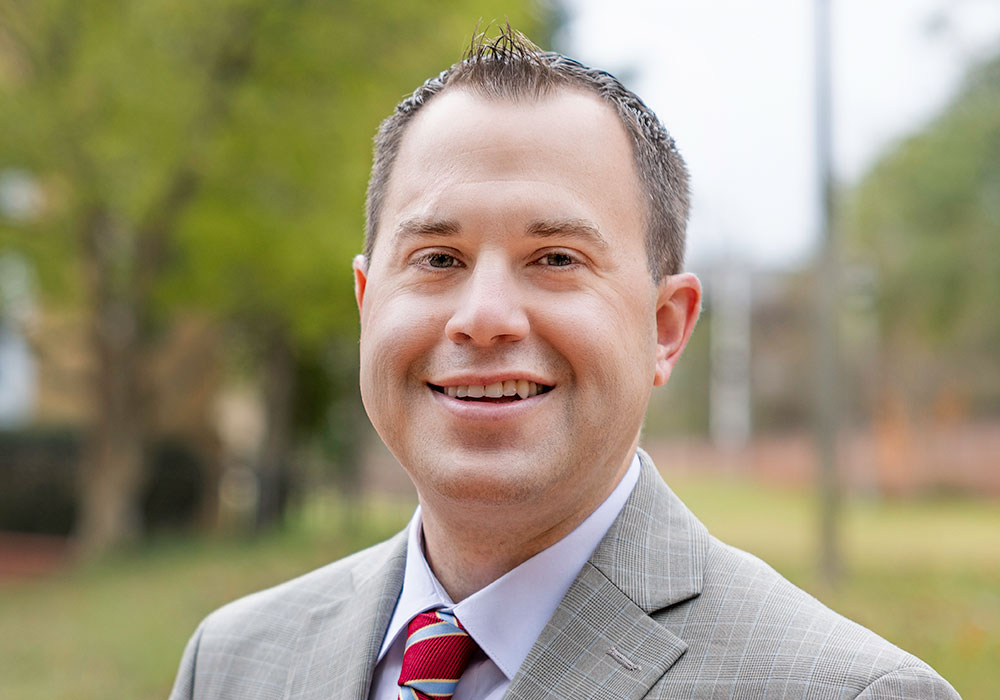Ryan Rucker may be a new name at the top of the syllabus at USC, but the College of Information and Communications instructor is no stranger to higher education — and he’s certainly no stranger to online instruction.
Rucker got his first taste of teaching tech while pursuing his undergraduate degree in technology support and management, which he earned from the University of South Carolina in 2007.
“That training piece of the degree, being able to actually go out and do training and learn about corporate training, kind of piqued my interest,” he says.
And in the years following graduation, he took every opportunity he could to explore that interest, particularly in the virtual arena. He helped faculty design Blackboard courses at the Medical College of Georgia, trained Department of Transportation employees to use various software applications, designed courses in USC’s Center for Teaching Excellence and eventually taught a spectrum of IT courses at Midlands Technical College.
Along the way, he bolstered his work experience with master’s degrees in educational technology, library and information science, and business administration, as well as a doctorate in education.
Rucker became comfortable in the virtual classroom, and he familiarized himself with the technologies that make it easier for students to become comfortable, too — software such as VoiceThread and FlipGrid, which allows students to communicate through video discussions. Then COVID-19 hit, and instructors like Rucker were suddenly a hot commodity.
“Almost overnight, everyone had to become experts in online teaching,” he says. “COVID has shown universities as a whole that there’s a need for more Centers for Teaching Excellence, more instructional designers, and for more faculty to have the training and support to teach online.”
His expertise was especially welcome in the College of Information and Communications. As home of the Master of Library and Information Science — the university’s second-largest online degree program — the college was well ahead of the game even before launching a new online master’s degree in data and communication this past fall. With courses that combine data science and strategic planning, the new degree prepares students to communicate complex ideas across an organization. And Rucker was the perfect fit to show them how.
"Technology is always changing, and so what I'm teaching you now will be obsolete two or three years down the road. But teaching you the concept of how to stay up to date with technology is something that I try to integrate into my courses."
“The program is about being able to take data, analyze it, and then do something with that data — being able to present it visually and to understand what the data actually represents,” he says.
His courses cover everything from Excel to Python, and enrollment has been steady, in large part because the demand for data skills has increased sharply in recent years. The U.S. Bureau of Labor Statistics projects the employment of data scientists will grow 36 percent over the next decade, with an average of 13,500 jobs available each year.
It’s not as much about the skills, says Rucker, as it is about understanding the limited shelf life of those skills. Staying on the cutting edge is a choice students must continue to make even after they leave his classroom.
“Technology is always changing, and so what I'm teaching you now will be obsolete two or three years down the road,” he says. “But teaching you the concept of how to stay up to date with technology is something that I try to integrate into my courses.”
That adaptability has benefitted him in his own career. Case in point: This fall, he found himself tasked with teaching a class on R, a programming language that’s frequently used in data mining. While he had some familiarity working with R, teaching it within the context of modern data-gathering practices was new territory, but his comfort with technology helped him get up to speed.
“That taught me what I’ve tried to teach my own students on how to become lifelong learners,” he says. “I kind of practiced what I preached.”
